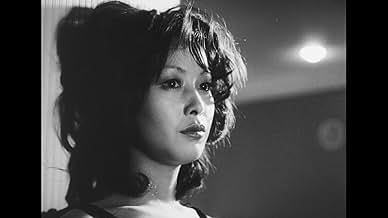NOTE IMDb
6,2/10
1,1 k
MA NOTE
Ajouter une intrigue dans votre langueA revolutionary faction steals some hand bombs. While escaping, several soldiers are killed. The movement's highest authority deems October unfit and sends the leader of another faction to t... Tout lireA revolutionary faction steals some hand bombs. While escaping, several soldiers are killed. The movement's highest authority deems October unfit and sends the leader of another faction to take the remaining bombs.A revolutionary faction steals some hand bombs. While escaping, several soldiers are killed. The movement's highest authority deems October unfit and sends the leader of another faction to take the remaining bombs.
Avis à la une
I found I liked this a little less than I did when first seen on video a few years ago. Perhaps it just shows what effect 9/11 and subsequent worldwide terrorist activities have had on our psyche. This remains a well put together, exciting and amusing tale of confused young fighters (for they know not what) on the streets of Tokyo late 60's. The pace and style of Wakamatsu's film making is infectious but the pain of events and concerns for safety have made it much more difficult to be sympathetic to lost youth taking it out on innocent people. It's a shame because this, almost Godard like, movie so full of vitality, could inspire many to take up the making of movies but instead one is now frightened that the vulnerable might be encouraged in their cowardliness to take out others for a bit of glory. A sad reflection of the times we find ourselves in. Good film though!
As I write, no one on IMDb has provided a synopsis for Ecstasy of the Angels, and the few reviews here are rather bereft of plot details; could that be because no-one who has watched it has got a clue what was going on thanks to the stupefyingly dull direction, the coma-inducing performances, and the fact that it is virtually impossible to tell one character from another? I reckon so.
Before I gave up trying to follow the story and began praying for the film to just finish and thereby end my misery (I'm obsessive about watching a film in its entirety, no matter how bad), here's what I garnered about the plot: The Four Seasons revolutionary group is split into factions that go by the names of— surprise surprise—the Four Seasons. Fall organises a raid on a US army base and makes off with some high explosives (stored in what looks like Bilbo Baggins' hobbit hole), but with members of her team killed and injured during the job, the way is left wide open for the other factions to help themselves to the spoils of her venture. Cue much arguing amongst angry freedom fighter types, and lots of strangely unemotional sex scenes between the uniformly hot female members of the group and the seemingly unappreciative blokes.
If I had known what I was in for, I would have passed on this film, but for some reason I had got it into my mind that this was a sleazy Cat III effort from Hong Kong; not only did I get the country of origin wrong—this is a Japanese flick—but I also was also severely misguided when it came to the kind of film this was. Rather than a trashy piece of Asian filth, Ecstasy of the Angels is a pompous, pretentious, and extremely dull avant-garde art-house film that could only possibly appeal to the bearded chin-stroker contingent; whilst they might enjoy waxing lyrical about the intent of the piece, the film's political message or the pointless techniques employed by the director (B&W to colour to B&W to colour, ad nauseum), anyone else will simply be bored rigid. Hell, I was practically catatonic by the end of the film's opening scene in which several of the characters sit around a table in a night-club while a singer drones on endlessly in the background.
Before I gave up trying to follow the story and began praying for the film to just finish and thereby end my misery (I'm obsessive about watching a film in its entirety, no matter how bad), here's what I garnered about the plot: The Four Seasons revolutionary group is split into factions that go by the names of— surprise surprise—the Four Seasons. Fall organises a raid on a US army base and makes off with some high explosives (stored in what looks like Bilbo Baggins' hobbit hole), but with members of her team killed and injured during the job, the way is left wide open for the other factions to help themselves to the spoils of her venture. Cue much arguing amongst angry freedom fighter types, and lots of strangely unemotional sex scenes between the uniformly hot female members of the group and the seemingly unappreciative blokes.
If I had known what I was in for, I would have passed on this film, but for some reason I had got it into my mind that this was a sleazy Cat III effort from Hong Kong; not only did I get the country of origin wrong—this is a Japanese flick—but I also was also severely misguided when it came to the kind of film this was. Rather than a trashy piece of Asian filth, Ecstasy of the Angels is a pompous, pretentious, and extremely dull avant-garde art-house film that could only possibly appeal to the bearded chin-stroker contingent; whilst they might enjoy waxing lyrical about the intent of the piece, the film's political message or the pointless techniques employed by the director (B&W to colour to B&W to colour, ad nauseum), anyone else will simply be bored rigid. Hell, I was practically catatonic by the end of the film's opening scene in which several of the characters sit around a table in a night-club while a singer drones on endlessly in the background.
Koji Wakamatsu's "Ecstacy Of The Angels" runs for a mere eighty-nine minutes. After it ended it felt more like eight nine hours. Wakamatsu, known as the "Pink Godfather" (no, don't ask me why), was a pioneer of the pinku eiga genre. I had never heard the name Wakamatsu before. According to the blurb in the festival guide, "Ecstacy of The Angels" is a parable about a revolutionary organization torn apart by betrayal, its members descending into paranoia, sadism and sexual decadence. It sounded like a plot from an early Godard film, only from a Japanese perspective. This sounded interesting, I thought. It was about as interesting as having a tooth extracted. The opening sequence, in black and white, is set in a nightclub. A female singer screeches absurd lyrics, while at a nearby table three men and a woman sit in silence. Pretty soon though, I couldn't figure out which revolutionary faction was which, and by that time I was beyond caring. The actors don't just speak their lines, the bellow them at each other, as if they were all auditory challenged. In the frequent sex scenes (which are about as erotic as two storefront mannequins coupling), they go through the motions of sexual congress while mouthing absurd platitudes about fighting for the revolutionary cause. Frankly, Wakamatsu is definitely no match for Godard. Which reminds me, I need to visit my dentist for a check up. It'll be less painful all round.
Koji Wakamatsu's treatment of this story is, compared to big budget filming, what guerilla warfare is to a full blown World War. Imagine seeing a hysterical comedy about idealistic terrorists betrayed by their leaders as written by Jean-Luc Godard, produced by David Lynch and directed by Gregg Araki: that gets you somewhere in the neighbourhood of what this picture is like. Untroubled by storytelling conventions Wakamatsu lets the thin thread that holds all scenes more or less together snap halfway through the film. His scenes of bloodcurdling violence are thrown at you with the gusto of a rabid modern painter. Visually brilliant and wonderfully over the top with some poignantly funny touches, this ranks as one of the most enthralling political nightmares ever printed on celluloid.
The film is a dated, incoherent, and pretentious rambling about fictional revolutionary, or rather quasi-revolutionary, terrorist group(s) in Tokyo in the sixties. Although there may be some resemblance to early Godard, Wakamatsu seems to be much less accomplished thinker, revolutionary, or craftsman than the French master of the New Wave. Notwithstanding the typically Asian overacting, all the persons in the "plot" act as detached mechanical puppets (perhaps intentionally?). They are not good in making either revolution or love. The frequent sex scenes were quite irritating not only because the participants recited quasi-political slogans, but also due to sometimes awkward choreography or cuts necessitated by the bizarre Japanese censorship law that does not allow a glimpse of pubic hair on the screen.
I wonder if the sign "WEAPON WEARHOUSE" on a weapon warehouse in the film is a joke for insiders or rather a testimony on the level of production values in this movie.
I wonder if the sign "WEAPON WEARHOUSE" on a weapon warehouse in the film is a joke for insiders or rather a testimony on the level of production values in this movie.
Le saviez-vous
- AnecdotesThis film was released in a time of violent social turmoil for Japan. ATG, the film's distributor, got cold feet when a rash of Christmas tree bombing, similar to the one in the movie, started to plague the streets of Tokyo. The film was quickly withdrawn from distribution and briefly re-released in the art theater circuit.
- GaffesWhile the revolutionaries enter the base, a sign reading "weapon wearhouse" instead of "weapon warehouse" is clearly visible for several seconds.
- ConnexionsEdited into Gli ultimi giorni dell'umanità (2022)
Meilleurs choix
Connectez-vous pour évaluer et suivre la liste de favoris afin de recevoir des recommandations personnalisées
- How long is Ecstasy of the Angels?Alimenté par Alexa
Détails
Box-office
- Montant brut mondial
- 585 $US
- Durée1 heure 29 minutes
- Couleur
- Mixage
- Rapport de forme
- 2.35 : 1
Contribuer à cette page
Suggérer une modification ou ajouter du contenu manquant

Lacune principale
By what name was L'extase des anges (1972) officially released in Canada in English?
Répondre

















